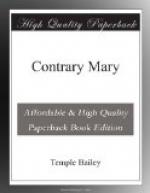“He is doing it for your good, Barry.”
“Why can’t I go South with Roger Poole?—if I must go away? He told me of a man who stayed in the woods with him.”
“That would simply be temporary, and it would delay matters. Gordon’s idea is that in this way you’ll be established in business. If you went South you’d be without any remunerative occupation.”
“Doesn’t Poole make a living down there?”
“He hasn’t yet. He’s to try story-writing.”
“Are you corresponding with him, Mary?”
Resenting his catechism, she forced herself to say, quietly, “We write now and then.”
“What does Porter think of that?”
“Porter hasn’t anything to do with it.”
“He has, too. You know you’ll marry him, Mary.”
“I shall not. I haven’t the least idea of marrying Porter.”
“Then why do you let him hang around you?”
“Barry,” she was blazing, “I don’t let him hang around. He comes as he has always come—to see us all.”
“Do you think for a moment that he’d come if it weren’t for you? He isn’t craving my society, or Aunt Isabelle’s, or Susan Jenks’.”
Barry was glad to blame somebody else for something—he was aware of himself as the blackest sheep in the fold, but let those who had other sins hear them.
He flung himself away from her—out of the house. And for days he did not come home. They kept the reason of his absence from Leila, and as far as they could from Constance. But Mary went nearly wild with anxiety, and she found in Gordon a strength and a resourcefulness on which she leaned.
When Barry came back, he offered no further objections to their plans. Yet they could see that he was consenting to his exile only because he had no argument with which to meet theirs. He refused to resign from the Patent Office until the last moment, as if hoping for some reprieve from the sentence which his family had pronounced. He was moody, irritable, a changed boy from the one who had hippity-hopped with Leila on Constance’s wedding night.
Even Leila saw the change. “Barry, dear,” she said one evening as she sat beside him in her father’s library, “Barry—is it because you hate to leave—me?”
He turned to her almost fiercely. “If I had a penny of my own, Leila, I’d pick you up, and we’d go to the ends of the earth together.”
And she responded breathlessly, “It would be heavenly, Barry.”
He dallied with temptation. “If we were married, no one could take you away from me.”
“No one will ever take me away.”
“I know. But they might try to make you give me up.”
“Why should they?”
“They’ll say that I’m not worthy—that I’m a poor idiot who can’t earn a living for his wife.”
“Oh, Barry,” she whispered, “how can any one say such things?” She knelt on a little stool beside him, and her brown hair curled madly about her pink cheeks. “Oh, Barry,” she said again, “why not—why not get married now, and show them that we can live on what you make, and then you needn’t go—away.”




